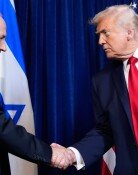Bush`s Mideast Plan Hits Snag
The U.S. policy toward the Middle East is under criticism for failing in prevent terrorist attacks in Saudi Arabia. Financial Times reported yesterday that the Washington`s Mideast policies have been cornered by suicide bombing attacks in Saudi Arabia, which occurred amid reconstructing post-war Iraq in disruption and skepticism spreading over Mideast peace plan.
The newspaper analyzed, President Bush`s evangelical vision of reorganizing the Middle East can conflict with the reality in the region and at home.
Seizing Bagdad earlier than expected has provoked not only compassion on Iraqi regime but also criticism of the U.S. operation as a neo-imperialistic attempt. U.S. calling for reform and democratization in the Mideast was also recognized as a threat to Arab`s belief.
Iraq reconstruction offered the U.S. a test to prove its good will, but during the rebuilding efforts, the U.S. has only complicated the chaotic situation in the war-torn nation. Besides, the U.S. failed to find weapons of mass destruction, which had provided the U.S. a cause for Iraqi attacks.
Washington`s proud roadmap to the Mideast peace and a plan to create Free Trade Area in the region are not welcomed either by Israel or by the Mideast, added the FT.
Over half of the U.S. citizens are urging their government to turn the eyes away from troubles overseas and work on domestic ones, such as economic recession.
Public approval rate of the incumbent administration has also dropped to a third in March this year from a year ago, when two third of American supported the government`s war against terrorism.
Other local media is joining the Final Times in reproaching the government`s failed policies. New York Times` columnist Maureen Dowd said, in her column on May 14, Washington has insisted that the war on Iraq caused Al Qaeda to cripple, brought peace to the Mideast and panic to terrorists. But it has turned out to be wrong.
In the meantime, the U.S. administration emphasized that Saudi itself was responsible for failing to stop the suicide bombers. U.S. ambassador to Saudi Arabia, Robert W. Jordan, charged yesterday, the U.S. urged the Saudi government to improve security around Riyadh residential areas some weeks before the car bombs, but the government didn`t heed our request.
On the day, the NY Times also reported that the U.S. and Saudi officials have been on high alert since two weeks ago, when they were informed of collected intelligence that warned of an imminent terrorist attack against Americans in Saudi Arabia.
konihong@donga.com havefun@donga.com







